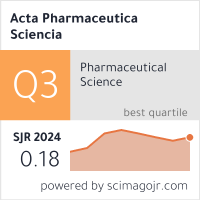Ethical Principles and Publication Policy
Publication Ethics
The journal's publication processes revolve around the equitable production, development, and dissemination of knowledge through scientific methods. Peer-reviewed original articles are studies that use scientific methods and ensure objectivity. All components of the publication process (publisher, editors, authors, reviewers, and readers) must adhere to ethical standards for scientific production.
In this context, the policies of 'publication ethics' and 'open access' necessitate that all elements of the publication process adhere to ethical principles, in accordance with the guidelines and policies established by the Committee on Publication Ethics (COPE), specifically the "Code of Conduct and Best Practice Guidelines for Journal Editors" and the "COPE Best Practice Guidelines for Journal Editors."
Journal Policy on Data Falsification and Data Fabrication
All articles submitted to the Acta Pharmaceutica Sciencia is subject to a strict plagiarism check. Therefore, we do not accept studies for publication that have a similarity rate exceeding 20%. In addition, the data set of each study is carefully reviewed by our editors, who are experts in the field. If these revisions show that the submitted study's statistical data did not adhere to research ethics procedures, we will reject the study's application without starting an editorial process. If we discover that the author(s) of the manuscript have falsified or fabricated data, we will report this to the author's institution and reject the manuscript. The journal's editorial members and/or reviewers reserve the right to request raw data from the author(s) used in the manuscript
Ethical Responsibilities of the Publisher
Acta Pharmaceutica Sciencia is published by Istanbul Medipol University, a public-spirited and nonprofit-making public educational institution.
This is an open access journal which means that all content is freely available without charge to the user or his/her institution. Users are allowed to read, download, copy, distribute, print, search, or link to the full texts of the articles, or use them for any other lawful purpose, without asking prior permission from the publisher or the author.
The Responsibilities of Editorial Board of Acta Pharmaceutica Sciencia
The Editorial Board of Acta Pharmaceutica Sciencia is accountable for the entirety of the article submission process. Making decisions independently while contemplating the public interest, rather than personal gain, is a requirement of this responsibility. The editors' decisions are made independently of the publisher and other individuals and institutions, and the relationship between the publisher and the editorial board is predicated on an independence policy.
- The Editorial Board of Acta Pharmaceutica Sciencia is committed to the continuous enhancement and elevation of the journal's quality.
- The Editorial Board of Acta Pharmaceutica Sciencia is responsible for establishing and implementing the journal's policies regarding publication, blind review, evaluation processes, and ethical principles.
- The Editorial Board of Acta Pharmaceutica Sciencia retains copyright ownership of the articles published within the journal.
- The Editorial Board of Acta Pharmaceutica Sciencia is tasked with safeguarding authors' intellectual property rights during publication processes and preventing unethical conduct, plagiarism, and citation manipulation,
- The Editorial Board of Acta Pharmaceutica Sciencia compiles "Instructions for Authors" to inform authors, about the submission, evaluation and publishing procedures.
- The Editorial Board of Acta Pharmaceutica Sciencia establishes incentive policies for authors.
- The Editorial Board of Acta Pharmaceutica Sciencia maintains recordings of each article in either electronic or written format.
The Responsibilities of Editors, Editor Assistants and Field Editors
- Editors aim to provide clear information to reviewers, authors, researchers, and readers, addressing their inquiries in accordance with the principles of clarity.
- Editors, in the publication process, evaluate that articles must be original and contribute to the existing literature, as well as serve the needs of readers and researchers.
- Editors consider several factors when making decisions regarding article publication, including originality, contribution to the field, clarity of expression, content, and the validity and reliability of the articles.
- Editors place the articles without any problems to the preliminary evaluation, consider favorable reviewer feedback, and do not change reviewer decisions unless significant publishing concerns arise.
- Editors enforce blind review standards and evaluation procedures, safeguard the personal identification information of authors, and ensure timely and impartial evaluations of manuscripts.
- Editors send articles to field editors and reviewers based on their areas of expertise, ensuring that the evaluations are conducted impartially and independently.
- Editors, during evaluation processes, assess the presence of conflicts or collaborations between authors and reviewers.
- Editors provide an important number of reviewers and constantly update this information.
- Editors exclude non-scientific content that fails to adhere to academic ethics standards.
- Editors guarantee that journal publication procedures adhere to established policies and guidelines, communicate updates regarding publishing policies to relevant parties, and provide training programs when required.
- Editors communicate effectively with everyone involved in the publishing processes, and organize meetings at regular intervals.
- Editors safeguard personal data in evaluated papers, maintaining the confidentiality of authors, referees, and readers.
- Editors prioritize the protection of human and animal rights in articles, emphasize the necessity of documented consent from participants, and reject submissions lacking ethics committee approval and permits for experimental research.
- Editors take precautions against misconduct In instances of complaints regarding abuse of duty, an objective investigation is conducted to share findings on the matter.
- Editors identify errors, inconsistencies, or misleading information in articles to be corrected.
- Editors defend the intellectual property rights associated with published articles and uphold the rights of both the journal and the authors in instances of violations. Editors also take the necessary precautions to ensure that the content of the published articles does not infringe the intellectual property rights of other publications; they control authenticity-similarity.
- Editors examine consistent critiques of the articles published in the journal and enable authors to respond to these critiques.
- Editors also consider studies that include negative conclusions.
- Editors assess the complaints submitted to the journal and provide appropriate responses.
Ethical Responsibilities of Reviewers
The articles in Acta Pharmaceutica Sciencia undergo a double-blind review process, ensuring that neither the authors nor the reviewers are aware of each other's identities. Reviewers are prohibited from direct communication with the authors. Evaluation forms and proofreading requests are submitted to the authors through the journal's website.
Reviewers are required to adhere to the ethical responsibilities outlined in Acta Pharmaceutica Sciencia as follows:
- Reviewers should only accept to evaluate the articles related to the field of their specializations.
- Reviewers should make the evaluation impartially and confidentially. In accordance with this principle, the documents of the articles they review should be erased after the evaluation process.
- The evaluation should remain impartial, unaffected by nationality, gender, religious beliefs, political beliefs, or commercial concerns.
- Reviewers who recognize a conflict or collaboration must notify the editors and refuse to evaluate the article.
- Reviewers are required to assess articles with a constructive approach, adhering to the principles of academic etiquette; they should avoid making insulting or hostile personal comments.
- Reviewers must notify the editors of the conflicts and collaborations about the article.
Ethical Responsibilities of the Authors
The ethical responsibilities of the authors that apply to Acta Pharmaceutica Sciencia are as follows:
- Authors must not submit an article that has been published or is under consideration for publication in another journal to Acta Pharmaceutica Sciencia concurrently.
- Authors must submit original articles to Acta Pharmaceutica Sciencia. Authors must appropriately cite the references utilized in their articles in accordance with ethical principles.
- Individuals who do not contribute to the articles should not be recognized as authors. Additionally, proposals to alter the author order of a published article or to add authors should not be proposed.
- Authors should provide the editorial staff with information about the articles or the raw data if required in the evaluation process of the articles.
- The authors must provide documentation regarding the rights to utilize the data presented in their articles, including permissions for research and approvals from the participants involved in the study.
- Authors must communicate with the editors to provide information, correct the article, or withdraw it upon discovering any errors related to the evaluation, early appearance phase, or the published electronic version.
- Author must indicate that they obtained ethics committee approval for research involving data collection through quantitative or qualitative methods, including experiments, surveys, scales, interviews, observations, and focus groups that necessitate an ethics committee decision. Additionally, the author must provide the name of the ethics committee, the date, and the decision number in the methods section of the manuscript. The author(s) must include information indicating that the informed consent form was obtained for clinical studies in the articles.
- The author(s) must provide evidence of their ethical principles regarding the data collection process, including obtaining permission to use documents such as scales, questionnaires, and photographs, within the article. The articles must comply with copyright regulations pertaining to research, publication ethics, and intellectual and artistic works. When conducting studies involving human and animal subjects, it is essential to report that the research adheres to international guidelines and standards.
- Approval from an ethics committee is not necessary for review articles. It is important to indicate in articles that do not require an ethics committee decision that such a decision is not necessary on the related section of the article.
Notification of Unethical Situations
Unethical situations involving articles, editors, reviewers, or authors, or articles that do not adhere to the ethical principles of Acta Pharmaceutica Sciencia should be reported.





